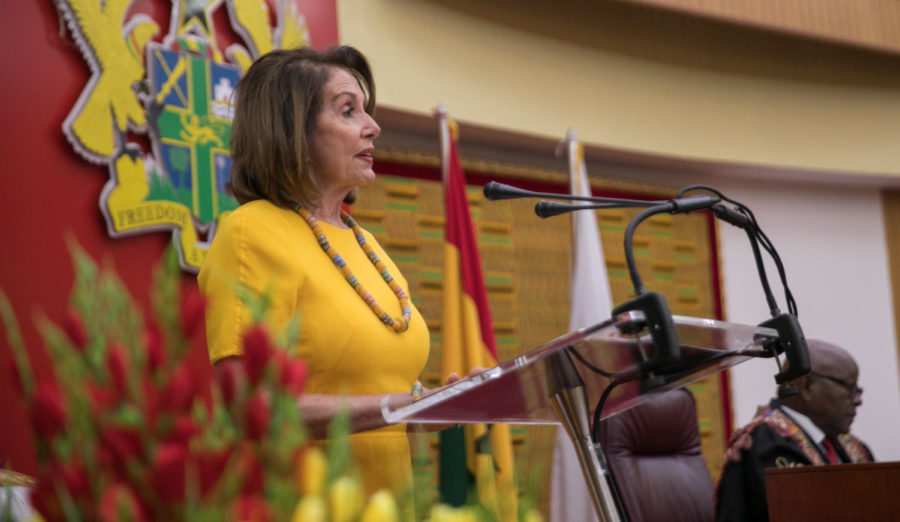Political violence, propaganda and the Pelosis
November 4, 2022
Photo courtesy of Flickr user U.S. Embassy Ghana.
On Oct. 28, an individual broke into Speaker of the House Nancy Pelosi’s home and attacked her husband, Paul Pelosi, with a hammer. The story is still developing.
Law enforcement sources have told news outlets that the alleged assailant, David Wayne DePape, was intending on attacking the speaker and had a list of other prospective targets. This is another harrowing example of the decay of American democracy as evidenced by political violence. Furthermore, it reveals how social media platforms’ refusal to curtail the spread of dangerous misinformation can lead to deadly consequences for private citizens and politicians alike.
Although the investigation is ongoing, NPR reported that social media accounts attached to the alleged attacker are flooded with various posts suggesting that the election was stolen, COVID-19 is a hoax, and other anti-Semitic tropes — all three of which have been critical themes in misinformation campaigns spread by conspiracy theorist groups like QAnon and 4Chan.
Statistics paint a dismal picture that quickly debunk the notion that this is an isolated incident. The Carnegie Endowment for International Peace provided a robust body of evidence to suggest that this problem is widespread. To name a few, threats against members of Congress are ten times as high as they were five years ago, armed demonstrations increased 47 percent between election day and inauguration day in 2020 and white supremacist activity rose 12-fold between 2017 and 2021.
Since the attack on the Capitol on Jan. 6, 2021, the threat of political violence has been a popular topic. Some political leaders suggest that the problem stems from “both sides.”
I disagree. As recently as 2019, William Braniff testified that “among domestic terrorists, violent far-right terrorists are by far the most numerous, lethal and criminally active… Over the last several decades, they are responsible for more… failed plots… successful plots… pursuits of chemical or biological weapons… homicide events… and illicit financial schemes than international terrorists, including HVEs.”
The Republican party has a responsibility to denounce violence and debunk misinformation which, as we have seen time and time again, leads to radicalization. But, responses to the attack on Paul Pelosi this weekend suggest that they aren’t taking this issue seriously.
Donald Trump Jr. took to social media over the weekend to share memes propagating a conspiracy theory about the attack rather than condemning it. Minority leader McCarthy said nothing.
As political tides shift, fringe extremist groups sometimes wrongfully take up acts of political violence. In American politics, the normalization of this kind of behavior is irregular and irresponsible.
Republican party leadership has co-opted and amplified the messages spread by online conspiracy theorist organizations in order to achieve short-term political objectives, creating a dangerous feedback loop that leads to violence, widespread mistrust, and democratic devolution. As a contentious midterm election season nears, it is imperative that party leaders take their roles seriously and condemn violence in all forms.






















